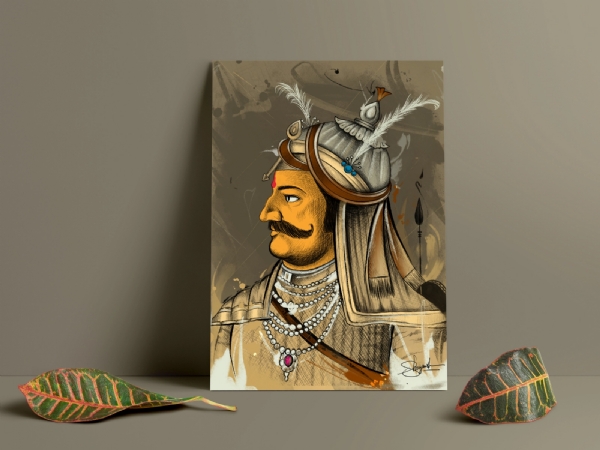NB In List | 5 prose of Rajasthani Folklore that elaborate the valor of Maharana Pratap - the savior of Hindu Dharma
Maharana Pratap refused to accept Akbar"s supremacy and fought against him in many battles, including the famous Battle of Haldighati in 1576
Total Views |
Maharana Pratap was a prominent ruler of the Rajput state of Mewar, located in present-day Rajasthan. He was born on today's date (May 9), in 1540, in Kumbhalgarh Fort. He was the eldest son of Maharana Udai Singh II.

(Photo credit: Dribble)
Pratap, even today, is remembered for his valiant efforts to defend his kingdom against Mughal Emperor Akbar. Maharana refused to accept Akbar's supremacy and fought against him in many battles, including the famous Battle of Haldighati in 1576. Rajasthani folklore ellaborates the legacy of Maharana Pratap in the most detailed desciptions of the scion & his battles. Here are five such prose and their meaning;
Maharana Pratap daringly staked his life and always on his feet, well equipped with arms and armour became a bottleneck for Akbar’s dream of the expansion of his empire in the Southern part of Rajasthan. But at the same time for Akbar, the noble king Maharana Pratap was also a neckline of Akbar’s heart, which is not to be enhanced because of his animosity with Akbar, but because Akbar had never come across in his lifetime with such a true, noble and braveheart warrior of blue blood. All other kings remained in fear, as a result all surrendered their pride and dignity to Akbar.
Another song entitled with “the inability of poets to raise praise for Maharana Pratap’s valour in the battlefield. These poetic lyrics convey that before the poets in admiration for grandiose of Maharana Pratap could prepare themselves with the maturity and ripeness to sing song in praise of chivalry and gallantry, another war started between the Mewar state and the centrally located powerful Akbar, the emperor of Hindustan. Maharana Pratap with his power-driven, invincible, dauntless spirit advanced to save his independence and dignity of the Mewar Kingdom soon after the battles of Deewer and Haldighati in the year 1576 against Akbar, but the poets could not get words to weave garland of appreciation in the glory of the noble warrior.
The poet’s heart is overwhelmed with the fearless bravery of warrior-king Maharana Pratap, whose undaunted brave leadership inspired many rulers of princely states to take refuge in his saviour-shield against oppressive forces and many dared to stand against humiliation and attack on their sovereignty. The writer regrets that there were no such contemporary existing poets during the imperial times of glorious Hindu scion, none other than Maharana Pratap, who could compose and sing actual version of the war-hero Maharana Pratap.
The composer of the above-given lyrics says that it was an exceptional coincidence that in the battlefield of Haldighat (18 June 1576), three Suns shone at the same time. The first was the illustrious shinning star and Scion (the saviour of Hindu dharma) Maharana Pratap. The second morning rising star that as the bright Sun everyday moves physically through the sky towards the western mountains to be set during evening hours. The third Sun was Jhalamaan, on that day of battlefield like the midday scorching midday Sun plunges ahead in war to stand by the side of brave warrior Maharana Pratap.
It means Akbar too could not resist his romanticized sensation to show his strength and intelligence and to get across face to face with Maharana Pratap. Akbar as the ultimate Emperor of Hindustan of medieval times always on the lookout to find ways to counter Maharana like a passionate fighter.
The story is based on the Research Paper penned down by Dr. Jayshree Singh, titled 'FOLK-LORE OF VEER RASA IN CONTEXT OF MAHARANA PRATAP’S VALOUR'
--


